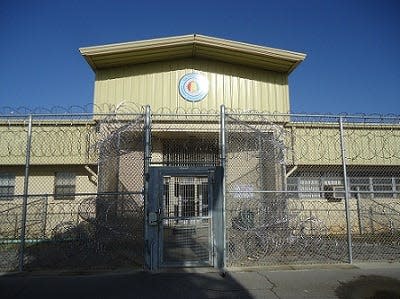Those in Alabama prisons need a reward system to encourage change
- Oops!Something went wrong.Please try again later.
EDITOR'S NOTE: Kenneth Traywick is incarcerated in Fountain Correctional Facility, a medium security prison in Atmore, Alabama.
It's time we start acting with common sense when it comes to our prison system in Alabama.
I already wrote an article about Gov. Kay Ivey's wise decision to address the flaws in the incentive good time policy for Alabama's nonviolent offenders. Again, I'll say that was a step in the right direction even if Gov. Ivey does not realize it.
Let me explain why I say this.
Back in January 2019, Alabama lawmakers passed voluntary sentencing standards, through Alabama Code Title 12 §12-25-31. Many know this as the Truth and Sentencing, or point system, guidelines. They did so in order to address the draconian over-sentencing practices of the Habitual Offender Act era. This practice helped clog the overcrowded and violent prisons, as well as allowed diversity in sentencing by racist and biased judges.

As Alabama was under the microscope of the Department of Justice at that time, that was a good start in addressing the real issues. However, it wasn't the end all be all solution. Alabama lawmakers understood the flaws in the laws as Gov. Kay Ivey understood the flaws in the good time policies. Understanding this and making one step forward should follow up with another step forward, then another, not three steps backwards.
Unfortunately, Alabama has been taking no more forward steps in this situation, but have been taking many steps backwards. For example, Alabama has all but stopped granting paroles, failed to repeal the Habitual Offender Act (HOFA), and now Senator April Weaver, R-Montevallo, is proposing a bill to cut good time earning incentives for those currently eligible for earning such credits for good behavior while in the Alabama Department of Corrections.
Right now, Alabama suffers from understaffed prison facilities at a historical alarming low, as well as the highest in violence, overdoses, and suicides in the nation. Under these current conditions the work and living environment for ADOC staff and confined citizens is at a very dangerous level. One of the leading contributions to these dangers is the fact that nearly 90% of those in these prisons have no incentive (such as incentive good time credits) to inspire good behavior and rehabilitation.
This is not knowledge that our lawmakers and governor are not aware of, so why would they not take steps to repeal the HOFA and give all who are eligible to return back to society good time?

Motivating incarcerated citizens to change criminal behavior and to participate in rehabilitation or educational programs can be very hard. Judicial cultures in America have only one way of looking at incarnation, and that is punishment.
In order to stimulate change and learning to motivate good behavior, you must reward the effort to progress, not just punish for past behavior or crime.
Let's take a look at the advantages of reward systems and why the state prison system in Alabama should use one.
Advantages of a reward system:
1. Appropriate behavior: Confined citizens will conform to appropriate behaviors when rewarded either intrinsically or extrinsically.
2. Increased motivation: Confined citizens will show interest and raise their participation in changing of behavior in everyday life tasks, responsibilities and learning.
3. Happier human beings: Incentives for confined citizens motivate them to be more productive because they create a feeling of pride, achievement and hope in returning home. Being successful and moving towards your goal (home) makes you happy.
4. Boosted self-esteem: Every success story helps a confined citizen to become more self-confident in doing things productively and legally. They are proud and encouraged to achieve another successful result.
5. Completed rehabilitation and educational programs: The National Association of School Psychologists suggests that reward systems help motivate students to complete their homework. It’s rather shocking that without rewards, students don’t complete it. This is only logical when applying to confined citizens who are working to truly change.
6. Improved results: Rewarding confined citizens encourages and endorses rehabilitation efforts as well as discourages violence and any other criminal behavior. They lead to improved outcomes for those confined, those overseeing prisoners and the public.
Examples of positive incentives in the typical work society includes recognition, promotions, raises and so forth. Negative incentives: include reprimands, demotions, pay decreases and other kinds of penalties. This example mirrors what is earned through the incentive good time credit system due this incarcerated
However, the Alabama Department of Corrections only incentivizes less than 15% of those they incarcerate (non-violent offenders), outside of store privileges phone access, and visits from family.
This is fact even if those that are (violent offenders) not receiving incentives successfully complete offered educational and rehabilitation programs. However, they do issue out many forms of negative incentives which only creates loss of hope.
Mastering the incentive theory of motivation can help improve management style, help those you incarcerate feel more valued, instill hope, and help focus goals to lower recidivism and an economic cost that haunts the state.
Psychologists have come up with a litany of different theories about what most essentially motivates human behavior. Those who espouse the incentive theory of motivation believe external factors, both positive and negative, are paramount in determining how people will behave. It's time we start acting with common sense when it comes to our prison system in Alabama.
Common sense tells us if we want to help keep people from bad behavior, we need to give them a reason to change. Common sense also tells us if we say the HOFA was "wrong then," it is wrong now and needs to be repealed. Let us push for good time incentives for all who can return back to society and repeal the draconian Habitual Offender Act.
This article originally appeared on Montgomery Advertiser: Those in Alabama prisons need a reward system to encourage change

